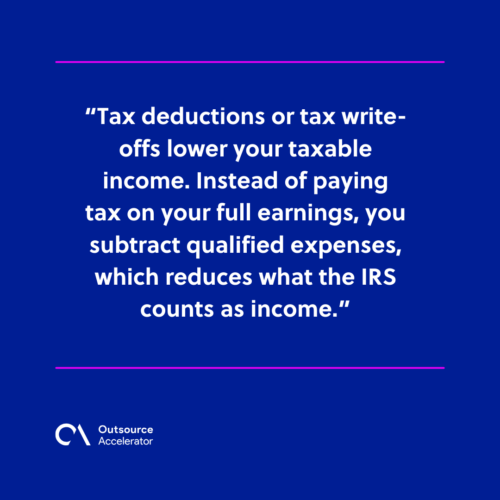16+ small business tax deductions you can write off

Running a small business shows you some unexpected surprises. Like just how many kinds of insurance there are, or that the IRS seems to have a guide for pretty much everything.
You started out wanting to build a product or offer a service. Now, you might also be doing the books, handling HR, and finding yourself online late at night, wondering if a certain expense is deductible.
Every dollar you save on taxes here is money you can put back into growing, hiring someone new, or just breathing a little easier when something unexpected pops up.
According to the US Small Business Administration, 99.9% of enterprises in America are considered small. And yet, it’s safe to assume many of them don’t take the full deductions they’re legally entitled to.
This guide will walk you through small business tax deductions you can write off so your company can invest more in itself.
What are tax deductions?
Tax deductions or tax write-offs lower your taxable income. Instead of paying tax on your full earnings, you subtract qualified expenses, which reduces what the IRS counts as income. The more you deduct, the less you owe.
To qualify, expenses must be both ordinary (common in your industry) and necessary (essential to running your business). Personal expenses don’t count, and mixing the two can get you audited or worse.
Keep it clean. Keep it honest. And keep your receipts.

Understanding your tax breaks as a small business
When you’re running a small business, figuring out which tax deductions apply to you can feel overwhelming. It’s easy to get lost in the sheer volume of information out there.
What often happens is that business owners don’t focus on deductions until tax season rolls around. But those forgotten expenses add up, and you end up paying more than you need to.
This is where having a solid bookkeeping system becomes your secret weapon. To claim those deductions you’re entitled to, you need to have clear, accurate records and make bookkeeping a regular part of your routine, not just an end-of-year headache.
Consistent monthly bookkeeping is the key to keeping track of all those deductible expenses as they happen. It helps you make sure you don’t leave any hard-earned money astray come tax time.
16 common small business tax deductions
Here’s a rundown of some of the most common ways small businesses like yours can reduce their tax bill:
1. Salaries and benefits
Wages paid to employees are deductible, and so are benefits like health insurance, paid leave, and retirement contributions. If you offer bonuses or commissions, those count too.
Even if you’re a sole proprietor, contractor payments can qualify as deductions when properly documented.
2. Rent expense
Whether you lease an office, retail space, or equipment, rent is fully deductible. If you rent a home and use part of it for business, you can deduct a portion of that expense, too. Remember to just keep the business use exclusive and well-documented.
3. Moving expenses
If you relocate your business, the associated costs, like transporting equipment or setting up utilities, may be subtracted from your taxes. The move must relate directly to your business and not your personal residence.
4. Telephone and internet expenses
You can also write off what you pay for your company’s phone line and internet service. If you use a personal plan, you must separate the business portion and claim only that.
Documentation is key here; estimate conservatively and support your claims.
5. Marketing expenses
Anything that markets your enterprise (digital ads, print materials, business cards, sponsored posts) counts as advertising. If it attracts customers or builds your brand, it’s likely deductible.
6. Business meals
You can discount at least 50% of meals, as long as the purpose is directly tied to your operations. This includes meals with clients, prospects, or employees. Keep detailed records of who was present and why the meal occurred.
7. Insurance
Premiums for company-related insurance policies can be written off. This includes liability, property, workers’ compensation, and even cyber liability insurance. If your policy protects your enterprise, it likely qualifies.
8. Interest and bank fees
Interest on lines of credit, and even business credit cards, is deductible. Bank fees, such as monthly service charges, overdraft fees, and wire transfer fees, are also included.
9. Company car usage
If you use a vehicle for company purposes, you can remove either actual expenses (fuel, repairs, insurance) or the standard mileage rate (67 cents per mile as of 2024). You must track usage accurately and separate personal miles.
10. Contract labor
Fees paid to freelancers or those working as independent contractors are eligible for tax write-offs as well. Just make sure you issue Form 1099-NEC for each contractor paid $600 or more annually. Keep contracts and invoices to back up your claims.
11. Depreciation
The tax regulations do not permit an immediate, full deduction for the cost of equipment, vehicles, or furniture.
Instead, you depreciate the asset over its useful life. The IRS offers accelerated options like Section 179, which allows larger upfront deductions.
12. Education
Courses, certifications, and workshops that improve your current organization are also deductible.
However, they must relate directly to your company’s improvements. A real estate agent taking a public speaking course? Deductible. A plumber learning web development? Probably not.
13. Home office
If you run your business from home, you can remove a percentage of home expenses based on square footage. Included within this are costs like rent or mortgage interest, utility bills, repair work, and the depreciation of assets. However, note that the space must be used exclusively and regularly for business.
14. Loan interest
Loans help fund growth, and the interest on those loans is deductible. Whether it’s a traditional bank loan or an online lender, as long as the funds go toward business activities, the interest can be written off.

15. Legal and professional fees
You can write off fees paid to accountants, attorneys, consultants, and tax preparers. If the service relates to your operations, it’s deductible in the year incurred.
16. Travel expenses
If you travel for work, you can often subtract what you spend. This covers flights, where you stay, what you eat, and other small costs during the trip. The main thing to remember is that the trip needs to be primarily for business reasons.
Often overlooked tax deductions for small businesses
You might be missing out on these less obvious deductions that could save you some extra cash:
Fringe benefits
Non-cash perks like gym memberships, commuter benefits, or childcare assistance often fly under the radar. If structured properly, many of these benefits are non-taxable to employees in certain places.
Employee bonuses and incentives
Many businesses forget to log performance bonuses, holiday gifts, or referral incentives. As long as they’re properly reported, these extras are deductible compensation.
Research and development
If you invest in new products, processes, or technologies, you may qualify for the federal R&D tax credit. You don’t have to be a tech startup. Applying science or innovation in any sector can make you eligible.
Technology adoption expenses
Upgrading your systems or adopting new tools, like CRMs, automation software, or cybersecurity platforms, can be written off. These costs often qualify as capital expenditures or software expenses.
Employee health and wellness programs
Programs that support employee well-being, such as mental health services, wellness challenges, or ergonomic assessments, are often deductible. They must be structured as formal wellness programs, not casual perks.
Best practices for claiming deductions
To make sure you get everything you’re entitled to, here are tips to handle your deductions:
- Use accounting software. Manual spreadsheets are a risk because of human error. Good software categorizes expenses and helps you catch things you’d otherwise miss.
- Digitize receipts immediately. Snap a photo, upload, and store. Electronic records are acceptable to the tax office if they are presented in a clear and easily accessible format.
- Track business use separately. For phones, vehicles, and the internet, keep logs to distinguish between personal and business usage.
- Review deductions quarterly. Don’t wait until April. Reviewing expenses regularly helps you stay on top of write-offs and spot new opportunities.
- Consult a tax advisor annually. Even if you file on your own, an annual check-in with a CPA helps you stay aligned with changes in tax law.
Mistakes to avoid when claiming tax deductions
Don’t let simple errors cost you. Be aware of these frequent mistakes when preparing your tax returns:
- Lumping personal and business expenses together. Like we’ve mentioned many times, keep them separate. For clearer financial tracking, use a separate bank account and credit card solely for business purposes.
- Overestimating deductions. Round up mileage, exaggerate usage, or claim vague “miscellaneous” expenses—and you risk penalties or audits.
- Missing deductions due to poor recordkeeping. You need proof to be able to claim a tax write-off.
- Forgetting carryovers. Not all deductions must be used in the same year. Losses, depreciation, and credits often carry forward. Know your options.
- Ignoring state-specific rules. States have their deduction limits and credits. What flies federally might not apply in your state.
Smart tax planning for small businesses
Small business tax deductions aren’t secret hacks. They’re legal, straightforward ways to keep more of the money you earn. But they only work if you stay organized, pay attention, and treat your bookkeeping with the same care you give your product or service.
Now might be a good time to audit your expenses, set up a receipt scanner, or schedule that accountant meeting you’ve been putting off. The point isn’t to do everything, but to start doing the right things consistently.







 Independent
Independent




